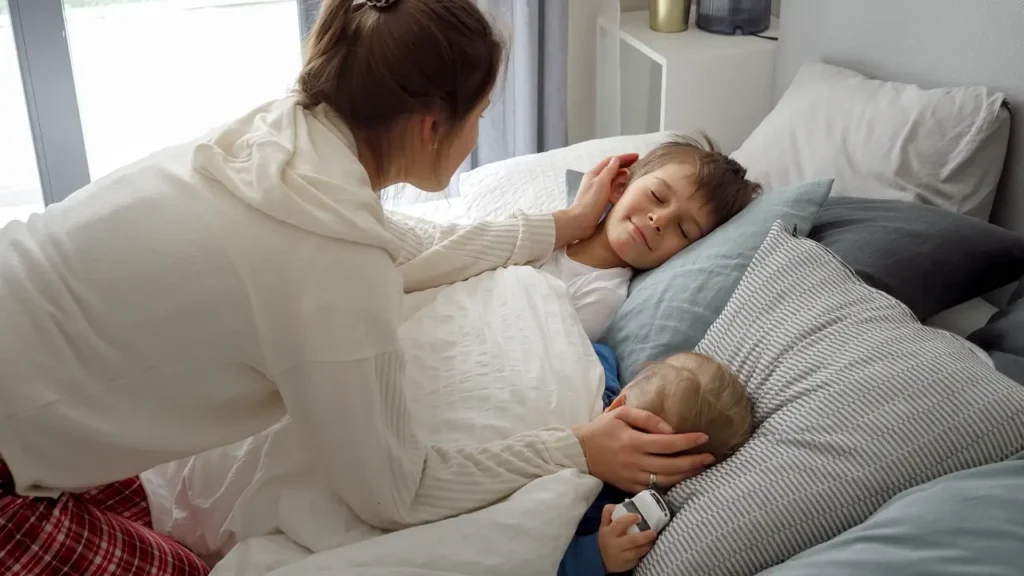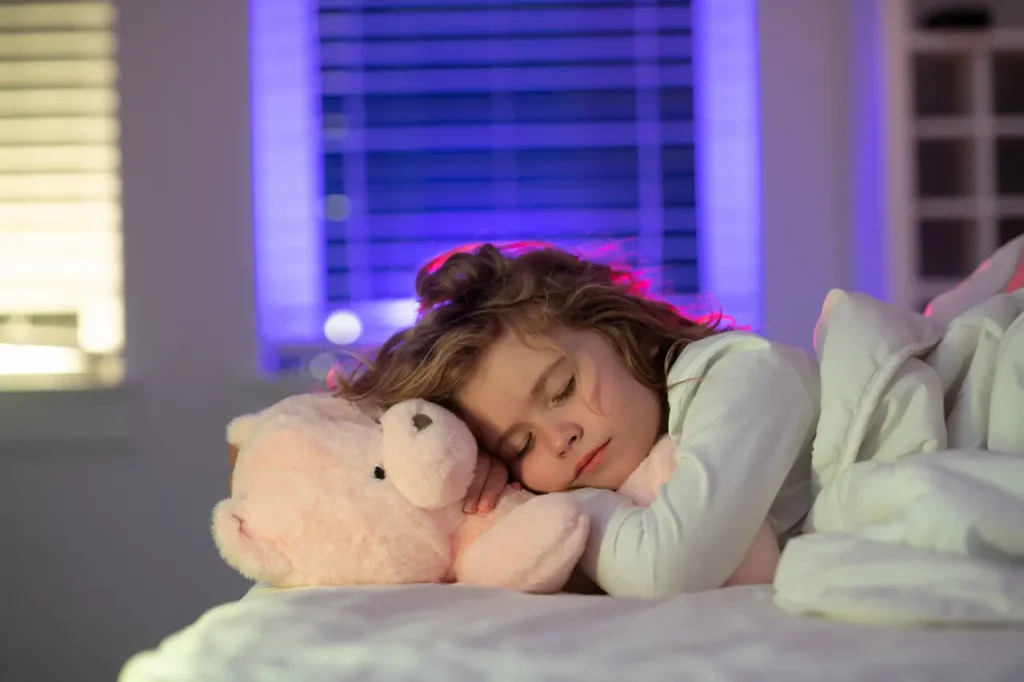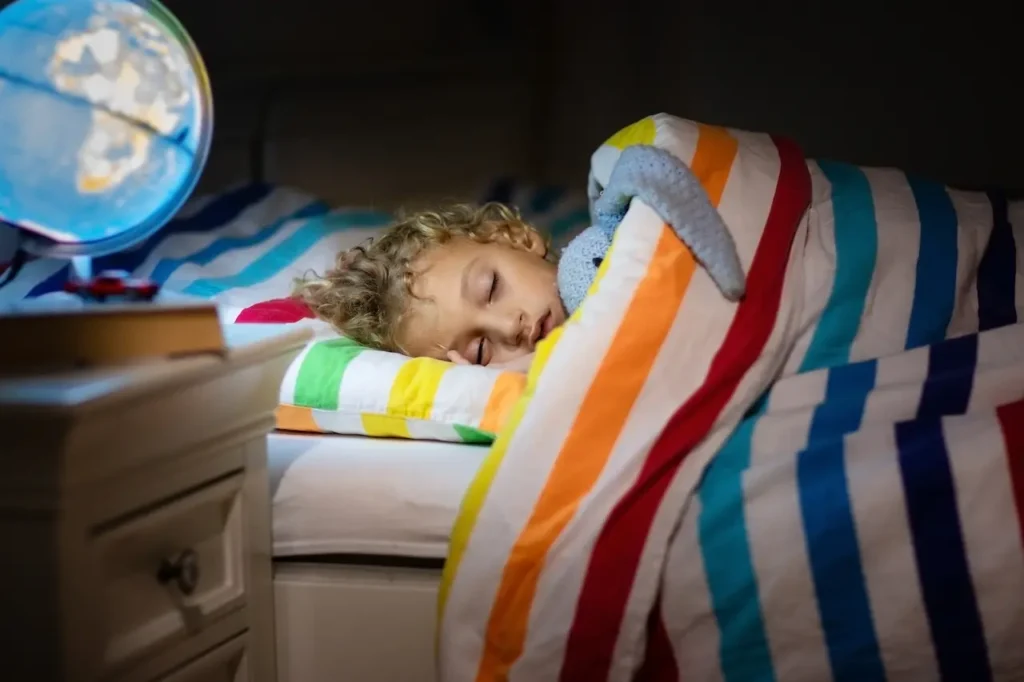Easy Ways to Get Kids to Sleep All Night
Simple Strategies for Getting Kids to Sleep All Night
Yes. There are easy ways to get kids to sleep all night. Here’s what you need to do. When everything is going smoothly, tucking in your toddler at night can be a real pleasure. The I Love You and kisses are a delight, as they go to sleep. When toddler bedtime problems arise – running after your wild child, wrestling him into his PJs, closing the bedroom door as they scream on the other side – it’s natural that parents fear the sunset.
Does this sound familiar? Many toddlers, including your personal Energizer bunny, resist going to bed. They don’t want to leave the excitement of climbing, running, and touching. They are so excited by the world! When your toddler is around 18 months, they begin to experience a phase of independence, and “No!” becomes their favorite word.
When it’s time to go to bed, they don’t hesitate to use their favorite word. Toddlers become tired. The more tired toddlers become, the more rigid and hyperactive they are. One poll reported that a third of toddlers–and half of preschoolers–regularly stall at bedtime…and many downright fight it.
This type of toddler resistance is normal, but toddler bedtime can be improved. Here are some common reasons why toddlers resist bedtime. How to help them sleep through these years.
Why Toddlers Do Not Sleep Through The Night
Remember the first time your child went to sleep in his or her bed and slept through the night? Bliss! Good news! That dream can be re-lived. Before we get to the bedtime solution for your toddler, let’s find out why he’s resisting it.
They are Going Through a Scary Stage.
It is normal for toddlers, especially at bedtime, to have some anxiety about being left alone. They may become anxious when the lights are turned off and worry that monsters lurk under the bed. Toddlers also have a variety of worries, from strangers to dogs and thunder.

Somebody is Bugging the Person.
You may experience discomfort, bright lights, or loud noises. Your toddler may be teething. You may find that your toddler is suffering from a cold or a heat-related illness.
They’re Over-excited.
Children can get irritated by TV or roughhousing. They may also be irritated because of something they have consumed. This could include sugary drinks or sweet snacks.
Your Help is a Magnet for Them.
Some toddlers never learn how to fall asleep by themselves. They rely on you to rock them, feed them, and hold them so that they can go to sleep.
The Timing of Their Bedtime is Wrong.
It is not possible to have a standard bedtime for every toddler. You may be putting them to bed too soon (so that they are not tired), or too late (so that they are overtired and wired).
There are many ways to get your children to sleep in their rooms. One way is to let them pick out the bedding so that they’re excited about their bed. Another great idea is to create a chart that rewards them with a small gift or sticker each night they sleep on their bed. There’s also the tired, bleary-eyed walk back to your bed.
We like these new ideas much more.
How Can I Help My Child Sleep Better at Night?
Sleep is important for the health and wellbeing of your child, but parents often struggle to help their children develop healthy sleeping habits. Sleep challenges can be a common problem, whether it is difficulty falling asleep, frequent awakenings at night, or an early morning start.
With the right approach, it is possible to help your child create a relaxing bedtime routine and improve their sleep. Here are some tips that will help you and your child get better sleep at night.
1. The LEGO Landmine
You can decorate the entrance of your bedroom by putting LEGO pieces on it. As soon as your children step on a LEGO piece, they should turn around and go back to bed.
2. Wig Out
Purchase a wig that looks like your hair and place it next to your child’s pillow. This will make him think that you are sleeping next to him.
3. Door Dilemmas
Tape maths equations on the front of your bedroom. Tell your children that they must get their equations correct to enter. You can also tape a list of chores on the doorway, which the children will have to remove. Only if the kids promise to complete the chores in the morning can they enter. This only works for kids who are able to read.

4. Sleep Wars
Wear a Darth Vader Mask to sleep. The loud noises and creepy masks could be enough for them to decide to stay in their rooms.
5. Comfortable Obstacle Course
Create a soft obstacle course with pillows, blankets, and cushions in the corridor from their bedroom to yours. They may fall asleep on their way to your bedroom if the area is soft. You may find them sleeping in the hallway, but at least you have an empty bed!
6. Sleep with Your Partner in Style
Think about a DIY cosleeping mattress as the clever family did. The family managed to squeeze five children and two adults into the same bed. Co-sleeping may seem crazy, but it’s the only way for some people to get a good night’s sleep.
7. Individualize Your Bedtime
According to the National Sleep Foundation (NSF), children of school age need between nine and eleven hours of sleep every night. There is a wide range of sleep patterns and needs. No matter what, most kids’ sleep patterns don’t vary much.
Even if they are put to bed later, early risers still get up at the same time. Night owls will not fall asleep until they feel ready. It’s therefore important that parents work with their kids to set a bedtime for them which allows them to sleep well and wake up on time.

8. Develop a Consistent Routine for Bedtime
Routines, especially for toddlers, are essential. Woods recommends that after dinner, you should have a light playtime before bathing, brushing teeth, reading a book, and then going to sleep. Set the right mood by creating a relaxing and soothing routine. Your child will feel tired as soon as the routine begins
9. Reduce Stress Before Going to Bed
10. Create an Environment that Induces Sleep
Little boy sleeping in his bed
What is the Normal Sleep Amount for a Newborn and Infant?
The average newborn sleeps 16-17 hours per day. They sleep between one and four hours each time. They are awake from one to two hours before they fall back asleep.
- In the first four to six months of life, babies sleep on average 14 hours per day.
- Children aged 1 to 3 should receive 12 hours of sleep per day.
Children need less sleep as they age. As adolescents, they should sleep nine to ten hours a night. Individuals have different sleeping needs and the sleep of an average child may not be optimal for them.
Why is Good Sleep so Important?
- Your child will grow big and strong if you give them a good night’s sleep.
- Sleep is important for your child’s weight. According to studies, sleep-deprived kids don’t produce as much of the hormone that tells the brain to stop eating. This makes them more likely to become obese.
- Sleep is important for building a strong immunity system. During sleep, your child can produce proteins that fight germs and help to prevent common infections.
- Sleep increases brainpower. Enough sleep improves attention span and helps your child focus in school.
According to a 2013 study, even an extra hour of sleep can improve children’s abilities to complete tasks and answer questions based on memory.
How Much Sleep is Needed by a Child?
Here is a guide if you’re not sure when your child should go to bed.
- Infants between the ages of 4 and 12 months are recommended to sleep 12-16 hours per day, including naps.
- Regularly, children aged between 1 and 2 years old should sleep from 11 to 14 hours per day (including naps).
- Children aged between 3 and 5 years old should sleep for 10 to 13 hours per day, including naps.
- Children aged 6-12 years old should sleep between 9 and 12 hours per day.
- Teenagers between the ages of 13 and 18 should sleep for 8 to 10 hours per day.
Conclusion
It’s normal for children to awaken throughout the night. Talk to your doctor if you are concerned about your children’s frequent wake-ups or feel something is wrong.
Your baby may wake up at night for reasons other than those listed above. You should learn your baby’s different cries, and how they communicate their needs to you.




